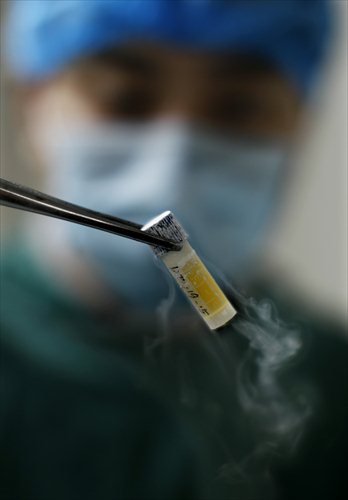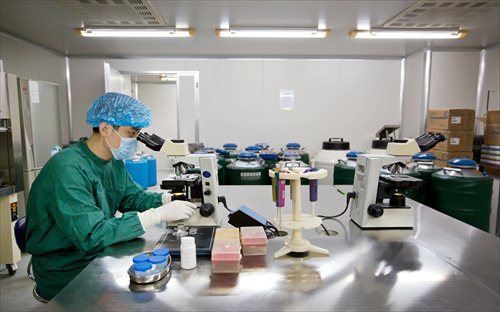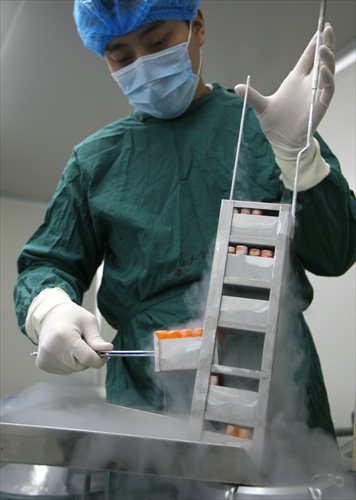HOME >> METRO SHANGHAI
China’s sperm banks facing dire shortage of quality donations
Source:Global Times Published: 2016-5-10 18:13:02
"Emergency! Shanghai Human Sperm Bank is facing a shortage! We are seeking donors. Each qualified donor can receive an allowance for buying iPhone 6s!"
Sperm has become a hot topic in China after news went viral that the Shanghai Human Sperm Bank is facing a shortage of donors - and willing to give men an allowance for buying iPhone for their deposit.
The sperm bank recently announced that, from the year of 2003 to present, sperm donations in Shanghai can not meet the high demand for quality sperm from barren Chinese couples.
The demand grew substantially following China's new two-child policy, announced in January of this year, which has witnessed a boom of older men and women seeking alternative sources for conception.
Shanghai is not alone. Human sperm banks in Beijing, Shanxi and Hubei also announced that their reserves of sperm were at an all-time low, following the implementation of the two-child policy.
Zhang Zhichao, a senior doctor at Peking University First Hospital's andrology (male fertility) center, pointed out that staying up late for long periods can threaten men's health. Irregular patterns such as working at night and sleeping in the daytime also put tremendous stress on men, which in turn causes their physical health and sexual desire to decline. This, said Dr Zhang, is one of the critical factors for infertility.
According to a 2012 White Paper on China's Human Sperm Quality Research, there were 40 million infertile women and men in China.
Twenty percent of male infertility cases were caused by poor sperm quality, meaning that the men could still produce semen but their sperm was not strong enough to impregnate women.
One expert said that most men ignore unhealthy conditions in their daily life, especially those related to living habits. Frequently going to a sauna or hot spring, for example, may seem beneficial for one's health but it can also damage a man's sex organs. Drinking alcohol, smoking cigarettes, driving a vehicle for long periods and even sitting at a soft sofa all day can be harmful for men's reproductive systems, as well as polluted environments and tainted foods.

Come as you are
As an entrepreneur, Mr Wang needed to stay up late every day to tend to his business, which over the years caused his sleep quality and heath condition to worsen. When he and his wife finally decided to have a child, a physical examination showed that Wang's sperm quality was not strong enough to impregnate his wife. So they turned to their local sperm bank for options.
According to Chinese law, the only legal channel to obtain human sperm for conception is to apply at a human sperm bank. Song Chunying, the director of Shanxi Human Sperm Bank, said that currently there are only 20,000 vials of sperm in their freezer. She added that since their bank first opened in 2006, they have never been able to fully satisfy the demand for sperm from interested couples. In 2015, over 800 donors offered their sperm to the Shanxi Human Sperm Bank, but only 106 passed all the requisite tests.
It should be noted that, unlike in Western countries, in China donating sperm is legally viewed as a "volunteer" public welfare activity, not a commercial one. However, in order to attract more sperm donors, many sperm banks are now emphasizing so-called "subsidies" to compensate donors for transportation and missed work hours.

In September of 2015, Hubei Human Sperm Bank sent out a social media message about "a new purchase plan for iPhone 6s" via its WeChat public account. Shanghai Human Sperm Bank sent out a similar message later that year. In 2016, Sichuan Human Sperm Bank raised the amount of their cash subsidies to 5,000 yuan ($768) for eligible donors.
Liquid pearls
Jiang Hui, a committee member of the Chinese Society of Andriatrics and the director of the andrology center at Peking University Third Hospital, said that the shortage of sperm in Chinese sperm banks demonstrates massive conflicts existing between supply and demand chains in China's medical market.
According to statistics, 1 percent of Chinese males suffer from Azoospermia, a medical condition of a man not having any measurable level of sperm in his seminal fluid. With such large population of infertile males in China, huge demands for quality sperm are being placed on the medical market.
The external supply capacity of China's sperm banks is also tragically limited. At present, there are only 22 sperm banks in all of China operating within nonprofit public hospitals. This critically low number of public facilities prevents the average eligible male donor, who may live in a distant rural region, from reaching a sperm bank however much he may be willing.
"Presently there are over 1,000 women registered with our center awaiting sperm donations, which means that they must wait between 1 to 2 years before they can receive insemination," said Jiang Hui.
Generally, the process of donating sperm takes 2 to 3 months. During this period, donors must visit the hospital 10 different times for exams. As this is seen as a tremendous inconvenience to an ordinary male donor, subsidies are high, between 4,000-5,000 yuan ($614.8-768.5) depending on the clinic and city.
Emotional barriers also keep many men from donating. Wu, a student from Capital University of Business and Economics, said that he once wanted to donate sperm. However, when he realized that strangers could be his children in the future, he could not take the next step.
Sperm bank representatives also said that some men will just use their clinic for a free physical examination, then disappear after receiving their report, which also places financial and resource burdens on sperm banks.
Immaculate ejaculate
But the low pass rate of quality sperm is the primary cause of China's sperm shortage. According to Beijing Times, the pass percentage in China is 15 to 20 percent. Every sperm bank strives to ensure their patients that the donated sperm is of the absolute highest quality, checked via DNA tests to examine chromosome variations.
Unfortunately, many men who are actually willing to donate their sperm turn out to suffer from myopia, abnormal liver function or genetic disorders, which render their sperm unusable.
In Western countries, the primary function of most sperm banks is as "maternity insurance," a service for those who want to have a child in the future and would like to save their own sperm in the bank for when needed.
Indeed, due to worsening living conditions and the declining environment of many countries, which can cause birth defects, saving one's sperm for the future can be regarded as taking responsibility for their future offspring.
Sadly, due to the huge demand for sperm in China, in recent years many profiteering clinics and unqualified doctors have attempted to deceive couples with quackery and fake remedies. Zhang Zhichao warns that anyone who is attempting to get pregnant should only go to an established public hospital for treatment. "Don't believe the magic curative effects of false advertisements," he said.
In fact, Zhang said that some infertile patients need only receive simple treatments to get pregnant. "Only a very small portion of patients need a 'test tube baby' procedure. Finding out the reasons of infertility is also crucial for receiving optimal treatment," he said.
Zhang explained that even though many couples are eager to become immediately pregnant, without long-term systematic treatment, the curative effect will not be satisfactory. For example, the effect of curing oligospermia (deficiency of sperm cells in the semen) can be seen only after three months of treatment, because sperm requires 74 days to become fully produced in a man's testis.
"It is impossible to have some so-called magic drags and then get pregnant within one month," Zhang said.
Compiled by Global Times based on an article from Beijing Times
Essential conditions for donating sperm in China
1. The nationality of the donor must be Chinese; his age must be between 22-45 years old; his height should be over 165 cm; he must be college educated; he may not have any bad habits e.g. smoking or drugs.
2. Donor's health condition must be excellent. Hepatitis B, color blindness, sexually transmitted disease or family genetic diseases are all grounds for disqualification.
3. Men who meet these strict requirements can contact their local sperm bank for an appointment. Applicants are required to bring their college degree and ID card. After successfully passing two free health examinations, including a physical examination testing chromosomes, microorganisms, four tests of eugenics, Hepatitis B, Hepatitis C, syphilis and HIV, applicants will be eligible to donate.
4. Following 6 months of cryopreservation (freezing) of the sperm, donors must return to the sperm bank for a blood re-examination. If donors successfully pass this re-examination, their sperm will then be offered to infertile couples.
Newspaper headline: Seminal contributions
Sperm has become a hot topic in China after news went viral that the Shanghai Human Sperm Bank is facing a shortage of donors - and willing to give men an allowance for buying iPhone for their deposit.
The sperm bank recently announced that, from the year of 2003 to present, sperm donations in Shanghai can not meet the high demand for quality sperm from barren Chinese couples.

Sperm being frozen for future use. Photo: CFP
The demand grew substantially following China's new two-child policy, announced in January of this year, which has witnessed a boom of older men and women seeking alternative sources for conception.
Shanghai is not alone. Human sperm banks in Beijing, Shanxi and Hubei also announced that their reserves of sperm were at an all-time low, following the implementation of the two-child policy.
Zhang Zhichao, a senior doctor at Peking University First Hospital's andrology (male fertility) center, pointed out that staying up late for long periods can threaten men's health. Irregular patterns such as working at night and sleeping in the daytime also put tremendous stress on men, which in turn causes their physical health and sexual desire to decline. This, said Dr Zhang, is one of the critical factors for infertility.
According to a 2012 White Paper on China's Human Sperm Quality Research, there were 40 million infertile women and men in China.
Twenty percent of male infertility cases were caused by poor sperm quality, meaning that the men could still produce semen but their sperm was not strong enough to impregnate women.
One expert said that most men ignore unhealthy conditions in their daily life, especially those related to living habits. Frequently going to a sauna or hot spring, for example, may seem beneficial for one's health but it can also damage a man's sex organs. Drinking alcohol, smoking cigarettes, driving a vehicle for long periods and even sitting at a soft sofa all day can be harmful for men's reproductive systems, as well as polluted environments and tainted foods.

Medical staff inspecting sperm count. Photo: CFP
Come as you are
As an entrepreneur, Mr Wang needed to stay up late every day to tend to his business, which over the years caused his sleep quality and heath condition to worsen. When he and his wife finally decided to have a child, a physical examination showed that Wang's sperm quality was not strong enough to impregnate his wife. So they turned to their local sperm bank for options.
According to Chinese law, the only legal channel to obtain human sperm for conception is to apply at a human sperm bank. Song Chunying, the director of Shanxi Human Sperm Bank, said that currently there are only 20,000 vials of sperm in their freezer. She added that since their bank first opened in 2006, they have never been able to fully satisfy the demand for sperm from interested couples. In 2015, over 800 donors offered their sperm to the Shanxi Human Sperm Bank, but only 106 passed all the requisite tests.
It should be noted that, unlike in Western countries, in China donating sperm is legally viewed as a "volunteer" public welfare activity, not a commercial one. However, in order to attract more sperm donors, many sperm banks are now emphasizing so-called "subsidies" to compensate donors for transportation and missed work hours.

Placing sperm into a cryopreservation storage facility. Photo: CFP
In September of 2015, Hubei Human Sperm Bank sent out a social media message about "a new purchase plan for iPhone 6s" via its WeChat public account. Shanghai Human Sperm Bank sent out a similar message later that year. In 2016, Sichuan Human Sperm Bank raised the amount of their cash subsidies to 5,000 yuan ($768) for eligible donors.
Liquid pearls
Jiang Hui, a committee member of the Chinese Society of Andriatrics and the director of the andrology center at Peking University Third Hospital, said that the shortage of sperm in Chinese sperm banks demonstrates massive conflicts existing between supply and demand chains in China's medical market.
According to statistics, 1 percent of Chinese males suffer from Azoospermia, a medical condition of a man not having any measurable level of sperm in his seminal fluid. With such large population of infertile males in China, huge demands for quality sperm are being placed on the medical market.
The external supply capacity of China's sperm banks is also tragically limited. At present, there are only 22 sperm banks in all of China operating within nonprofit public hospitals. This critically low number of public facilities prevents the average eligible male donor, who may live in a distant rural region, from reaching a sperm bank however much he may be willing.
"Presently there are over 1,000 women registered with our center awaiting sperm donations, which means that they must wait between 1 to 2 years before they can receive insemination," said Jiang Hui.
Generally, the process of donating sperm takes 2 to 3 months. During this period, donors must visit the hospital 10 different times for exams. As this is seen as a tremendous inconvenience to an ordinary male donor, subsidies are high, between 4,000-5,000 yuan ($614.8-768.5) depending on the clinic and city.
Emotional barriers also keep many men from donating. Wu, a student from Capital University of Business and Economics, said that he once wanted to donate sperm. However, when he realized that strangers could be his children in the future, he could not take the next step.
Sperm bank representatives also said that some men will just use their clinic for a free physical examination, then disappear after receiving their report, which also places financial and resource burdens on sperm banks.
Immaculate ejaculate
But the low pass rate of quality sperm is the primary cause of China's sperm shortage. According to Beijing Times, the pass percentage in China is 15 to 20 percent. Every sperm bank strives to ensure their patients that the donated sperm is of the absolute highest quality, checked via DNA tests to examine chromosome variations.
Unfortunately, many men who are actually willing to donate their sperm turn out to suffer from myopia, abnormal liver function or genetic disorders, which render their sperm unusable.
In Western countries, the primary function of most sperm banks is as "maternity insurance," a service for those who want to have a child in the future and would like to save their own sperm in the bank for when needed.
Indeed, due to worsening living conditions and the declining environment of many countries, which can cause birth defects, saving one's sperm for the future can be regarded as taking responsibility for their future offspring.
Sadly, due to the huge demand for sperm in China, in recent years many profiteering clinics and unqualified doctors have attempted to deceive couples with quackery and fake remedies. Zhang Zhichao warns that anyone who is attempting to get pregnant should only go to an established public hospital for treatment. "Don't believe the magic curative effects of false advertisements," he said.
In fact, Zhang said that some infertile patients need only receive simple treatments to get pregnant. "Only a very small portion of patients need a 'test tube baby' procedure. Finding out the reasons of infertility is also crucial for receiving optimal treatment," he said.
Zhang explained that even though many couples are eager to become immediately pregnant, without long-term systematic treatment, the curative effect will not be satisfactory. For example, the effect of curing oligospermia (deficiency of sperm cells in the semen) can be seen only after three months of treatment, because sperm requires 74 days to become fully produced in a man's testis.
"It is impossible to have some so-called magic drags and then get pregnant within one month," Zhang said.
Compiled by Global Times based on an article from Beijing Times
Essential conditions for donating sperm in China
1. The nationality of the donor must be Chinese; his age must be between 22-45 years old; his height should be over 165 cm; he must be college educated; he may not have any bad habits e.g. smoking or drugs.
2. Donor's health condition must be excellent. Hepatitis B, color blindness, sexually transmitted disease or family genetic diseases are all grounds for disqualification.
3. Men who meet these strict requirements can contact their local sperm bank for an appointment. Applicants are required to bring their college degree and ID card. After successfully passing two free health examinations, including a physical examination testing chromosomes, microorganisms, four tests of eugenics, Hepatitis B, Hepatitis C, syphilis and HIV, applicants will be eligible to donate.
4. Following 6 months of cryopreservation (freezing) of the sperm, donors must return to the sperm bank for a blood re-examination. If donors successfully pass this re-examination, their sperm will then be offered to infertile couples.
Newspaper headline: Seminal contributions
Posted in: Metro Shanghai, City Panorama